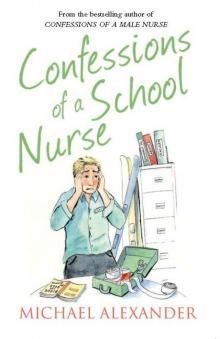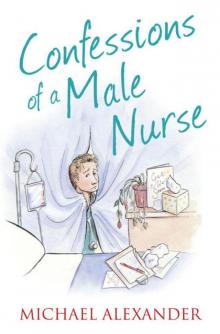- Home
- Michael Alexander
Confessions of a Male Nurse
Confessions of a Male Nurse Read online
Confessions of a Male Nurse
Michael Alexander
From the people who brought you the bestselling Confessions of a GP.
From stampeding nudes to inebriated teenagers, young nurse Michael Alexander never really knew what he was getting himself into. But now, sixteen years since he was first launched into his nursing career – as the only man in a gynaecology ward – he’s pretty much dealt with everything: Body parts that come off in his hands; Teenagers with phantom pregnancies; Doctors unable to tell the difference between their left and right; Violent drunks; Singing relatives; Sexism; …and a whole lot of nudity.
Confessions of a Male Nurse is a touching, shocking and frequently hilarious account of one man’s life in nursing.
Review
‘A fantastic read. Everything I had always suspected about nurses and so much more!’
- Dr Benjamin Daniels, author of bestselling ‘Confessions of a GP’
‘An incredibly emotional journey.’
- Star Magazine
MICHAEL ALEXANDER
Confessions of a Male Nurse
For my wife and kids
Disclaimer
The stories described in this book follow my progression from an inexperienced nurse to a relatively effective professional. To protect confidentiality, some parts are fictionalised, and all places and names are changed, but nonetheless they remain an honest reflection of my experience working as a male nurse over the past 16 years – surprising as that might come to be!
Who am I?
I am just your everyday, run-of-the-mill nurse, with a unique story to tell. Okay, unique is not quite accurate; anyone that spends time working in healthcare has their own uniquely similar stories. Every day we come into contact with people from all walks of life, from the destitute to the wealthy, the young to the elderly, simple to genius, cruel to caring.
Though I never planned on being a nurse, caring for others was in my blood: my great-grandfather was a medic through two world wars, and my mother was also a nurse. Medicine provided them with a living, and so at the wholesome age of 17 I figured it would be good enough for me; nursing meant a guaranteed job. Little did I know that nursing would prove to be so much more than just a way to make a living.
Now, 16 years on, I’m still working in healthcare. I wouldn’t be if I didn’t like caring for others, but I’m only now realising that nursing isn’t just about what I can do for others; nursing is also good for me. Everyone likes that warm feeling they get when they help someone. Well, I really like it, and especially when I’ve done that little bit extra.
Looking after others is all I’ve ever known. I’ve seen people in all states of health, both mentally and physically, and I have come to the conclusion that our bodies themselves are the greatest equalising factors in our inglorious existence. Now, I want to show you what it’s like, what it takes, and what really goes on in the front line of the caring profession.
Why do I want to do this? On the positive side, I want to tell you just how amazing your average nurse really is; I want to prove that a good nurse can literally be the difference between life and death. On a more negative note, this is my chance to make up for the times when I should have spoken out about some of the horrendous goings-on in many hospitals, but didn’t; times when I kept quiet, because of fear, ignorance, or simply being at a loss about what to do.
Introduction
There is one thing almost all of us are going to be at some point, and that is a patient. One day, most of us are going to need to depend on someone when we are at our weakest. That someone is most likely going to be a stranger and that stranger is most likely to be a nurse.
I have worked with patients suffering from dreadful diseases, some of which I had never even imagined, let alone dealt with, like Guillain-Barré syndrome or motor neurone disease, or horrific cancers that spread through the body. Now, after 16 years, I’ve done pretty much everything – from keeping someone comfortable while their body is failing and the pain is getting too much to cope with, to chasing a confused (and very naked) patient down a corridor. I’ve learnt how to deal with a family who have been told their loved one is not going to make it (which never gets any easier, regardless of whether it is expected or not). I’ve experienced my fair share of emotions: frustration, impotence, despair, at the unfair ways disease and misfortune can strike those most deserving of life; at other times, relief when someone’s suffering ends.
But no matter how much I sympathise, I don’t really know what it is like to be a patient. I have only seen things from a nurse’s perspective, where you can’t afford to get too emotional or involved. I often wonder what it must be like to be on the other side, to be lying in bed, to see things through a patient’s eyes.
The only way I have of imagining is to use my experience of the way people in the past have reacted to being in my care.
What I have noticed, is that a person’s behaviour generally changes as soon as they become a patient. Some people become extremely nervous, which is understandable, and may explain why some pretty silly questions are asked. Does surgery mean I will have to have an operation? Then, there are the people who, during a ward round with their consultant, will nod as if in understanding, but when the doctor leaves they haven’t the faintest idea what is going on. I’ve heard many a patient, when asked by their consultant, ‘How do you feel?’ respond by saying that they feel fine, when in fact they’d spent the morning complaining about their ailments.
Some people suddenly find they are unable to do simple tasks for themselves, like pour their own water or fluff their own pillows, even if they are physically quite capable. Others become so used to being in hospital that they know how a ward runs better than some of the staff. Some become so demanding that no matter how many of their requests are satisfied, they will never be happy, while others are so grateful for any small service – even just spending five minutes listening to them – that they want to shake your hand or marry you off to one of their grandchildren. I’ve seen people too afraid to disturb the nurse, as they don’t want to be a burden, even though they are worried about the pain in their chest. I’ve seen others treating nurses like servants. Then there are people who lose all initiative, because they aren’t sure what they are supposed to do; they don’t know how to be a patient and they’re not sure what exactly a nurse’s role is.
When I picture myself sitting for hours in the waiting room, seeing patients who came after me being dealt with first, I wonder whether this would irritate me, or whether I’d be calm and rational, like all nurses want their patients to be. Then when I finally get called through to see the doctor, I imagine expecting the doctor to have all the answers to my problems as, ‘Doctor knows best.’
It must be frightening for patients who are admitted to be put on a drip, to have blood taken every day, or tubes stuck in some surprising places. For some having to share a room with a bunch of sick strangers might seem difficult.
But that’s why I’m here, your average nurse. It isn’t just about giving you your medicines and dressing your wounds. I’m here to explain things, including the foreign language the doctors use. I’m here to help you in and out of bed, to help you help yourself. I’m here to help calm you in the night when you wake up wondering where you are, or worrying about that pain in your chest. I’m here to help make your treatment as bearable as possible.
I
Slippery beginnings
Did I always know what I was doing? Of course not, but I couldn’t tell the patients that. A nurse must be confident and assertive, yet caring. The problem was I didn’t feel confident, nor the least bit assertive; I did care, though.
I will never forget my first
day at Allswell, a hospital situated in the middle of nowhere – well, maybe more like everywhere. Allswell was a fairly typical example of all that is good, bad, outrageous and hilarious about hospitals across the civilised world. I remember vividly the reaction as I walked into the ward and explained I was the new nurse; mouths dropped open and there were mutterings of ‘there must be some mistake’ and even ‘this is a joke’. The nurse in charge of the ward even made a phone call to the head of personnel to explain the problem. You see, I was not just straight out of college; I was the only male in a gynaecology ward. The most important people I met that first day were Sharon and Cherie. Sharon was the nurse in charge of running the ward, similar to a traditional Matron. Cherie was the nurse whose job it was to familiarise me with the ward. It was a huge responsibility for her, although I didn’t realise it at the time. Over the next two months, Cherie’s task was to transform me from a naïve new graduate to an effective, safe and efficient member of the team. I don’t think either of us knew how difficult that was going to be.
My first day was spent following Cherie around. I was introduced to every patient and shown where everything was: the fire escape, cardiac arrest alarms, cardiac arrest trolley, treatment room, sluice room. I was handed a three-inch-thick folder of policies and instructed in the use of the computers, admission and discharge procedures.
All I really wanted to do was get my first patient and see if I could do the job. I went home that first day forgetting everything Cherie told me.
My third day on the job and I still didn’t feel the slightest bit at ease. In fact, I was feeling worse. Driving to work each morning, my mind was in overdrive thinking of the things that could go wrong, of all the ways that I could stuff up, and today I was getting my first patient.
‘I’m going to give you Mrs Stewart,’ Cherie said to me. ‘She’s day one post an abdominal hysterectomy. It will be good experience for you.’
Before starting on the ward the only time I had to think about a uterus was in the class studying anatomy books, and now here I was helping a patient recover from having one of the most intimate parts of her womanhood removed.
Forty-three seemed quite young to be having a hysterectomy, but at least Mrs Stewart already had three kids, so hopefully she wouldn’t feel too bad about her surgery.
‘Good morning, Mrs Stewart,’ I said, as I walked in the door. ‘I’m your nurse for the day. How are you feeling?’
Even hooked up to an infusion of narcotics, her shocked expression made it clear that the last person Mrs Stewart expected to see in a gynaecology ward was a male nurse.
She soon got over her shock. She had other things to worry about, such as the tubes sticking in her arm, the urinary catheter, and an abdomen that had been sliced open and sutured up.
‘I don’t know. How should I feel?’ she asked me. ‘I can’t feel anything. I’m numb from the stomach down. I had prepared myself for some pain.’ She sounded almost disbelieving.
‘It’s the miracle of the epidural,’ I replied, trying to sound knowledgeable, without actually having the faintest clue as to how effective epidurals normally are.
‘Well it’s amazing. I never thought I would feel this good. I wish I’d had this when I had my kids.’
I nodded my agreement and kept silent; there really wasn’t a lot I could say.
The shift seemed to go better than I’d expected, although this was probably due to the bright spirits of Mrs Stewart, as opposed to any particular skill on my part. Still, she didn’t seem completely at ease in my presence.
‘I can’t wait to tell my husband I’ve had a male nurse looking after me.’
Mrs Stewart had made this remark at least a dozen times over the course of the day and it seemed a bit forced, almost as if she was still trying to convince herself that it was okay to have a male nurse. Never mind, I was sure she would feel better about it by tomorrow; at least, I hoped so, because tomorrow was going to be a lot more challenging, for her as well as me.
The next morning, Cherie informed me that Mrs Stewart was to have her epidural removed.
‘It’s pretty straightforward,’ Cherie explained, ‘just pull.’
I was expecting something a little bit more detailed, but ‘just pull’ sounded easy enough.
‘Oh, and make sure you give her some analgesia straight after you take it out. You want to have something working before it wears off,’ Cherie added, before heading off on her own rounds.
Epidurals are not something nurses learn about in detail, although they’re pretty simple to follow. A needle is inserted between the vertebrae of the back, into the epidural space. The epidural space is a membrane that surrounds the spine. A plastic tube is threaded along the needle and into this space. The needle is removed, while the plastic tube is left in place and an infusion of analgesia is slowly pumped. This keeps the patient completely pain free from about the navel down.
All I had to do was ‘pull’ the tube out.
Thankfully, Mrs Stewart was philosophical about having the epidural removed.
‘I’m not looking forward to the pain, but I guess it means I’m making good progress,’ she said.
‘Oh, don’t worry, Mrs Stewart. We’ll give you some medicine before the epidural wears off. You’ll be fine,’ I said, as I picked up her drug chart.
She seemed comforted by my words. I looked at her drug chart to see exactly what sort of analgesic I could give, but decided it would be better to ask Cherie. As Cherie was the nurse guiding me, she was the person I was to go to with any problem, no matter how big or small.
‘We usually give a Voltaren suppository,’ Cherie answered when I asked her. ‘It’s long-lasting and tends to work really well. You’ve given one before, haven’t you?’
I had given one before, but only to a male patient. Somehow, during my student training I had managed to avoid having to go near women’s private parts. I explained this to Cherie, and her face brightened with a smile.
‘Well, there’s not much difference. You can’t go wrong.’
I wasn’t so sure.
The epidural was removed under Cherie’s supervision and it really was as simple as she had described, a slight ‘tug’ and it was out, no resistance, no trouble. A bit of iodine and a transparent dressing and everyone was happy. To make the most of a good opportunity (that is Mrs Stewart held on her side by Cherie and her bottom facing me) I prepared to give the suppository.
‘Stop,’ Cherie said, as I had one hand on Mrs Stewart’s upper cheek, while the other hand was ready to do the deed.
‘What’s wrong?’ I asked, frantically trying to think what I had done wrong.
‘Aren’t you forgetting something?’ Cherie asked me.
Under pressure my mind remained a blank.
‘The jelly – the lubricant – you forgot to put some on your finger,’ she said, in a slightly exasperated tone of voice.
‘Oh, yeah right, sorry,’ I replied, as I squeezed the tube of jelly a little too hard. So hard that I managed to lather up not just my finger but both of my hands as well. Cherie rolled her eyes but kept silent.
I hadn’t even begun to insert the suppository because with my rubber gloves soaking in lubricant I was struggling to hold up her cheek with one hand and the suppository in the other. The cheek kept slipping down and covering the target. I looked up to see an amused (and slightly bemused) looking Cherie.
‘Let me help,’ Cherie said as she grabbed hold of Mrs Stewart’s cheek and held it up.
‘Here we go, Mrs Stewart,’ I said as I went for gold.
I heard Cherie stifle a gasp. I suddenly felt nauseous.
With far too much lubricant on my hands, the suppository had missed and gone in the wrong hole. At least Mrs Stewart didn’t seem to notice anything because she was still numb from the remains of the epidural.
‘I’ve never seen that happen before,’ remarked Cherie.
I looked up into her face and gave her a ‘What now?’ sort of look.
&n
bsp; She made a hooking gesture with her finger.
‘You must be kidding,’ I mouthed back at her. There was no way I was going searching in ‘there’ – it even crossed my mind that ‘searching’ in ‘there’ could be a form of abuse. My only hope was that it hadn’t gone too far. One thing I was sure of was that Voltaren was pretty rough on the stomach, and I began to worry what it could do if left in such a sensitive place.
I needed to move fast because this felt wrong. I looked up at Cherie again and shook my head. There were some things a man should not do and this was one of them. But Cherie motioned for me to hurry up and get on with it.
‘You’re a nurse now,’ Cherie whispered quietly, as if this meant I had an open licence to dig around in women’s private parts.
Eventually, I took a deep breath and with a quick flick of my index finger I managed to scoop out the offending suppository. Cherie gave me a ‘thumbs up’. I quickly popped the thing in the right spot, while Cherie rolled Mrs Stewart back on to her back.
‘All done, Mrs Stewart,’ I said. ‘How do you feel?’
Mrs Stewart took a moment to answer. She gave me a strange look.
‘Fine,’ she said eventually.
I left the room very quickly, without saying another word.
‘You won’t tell anyone, will you?’ I asked Cherie back in the nurses’ office. ‘I felt like a total pervert,’ I added.
Cherie didn’t answer, because she was bent double laughing – although she eventually recovered long enough to inform the whole ward.
Sharon’s law
A nurse is a nurse first, and a woman (or in my case, a man) second. At least, that was the thinking of my mentor, Cherie. One of Cherie’s favourite sayings was, ‘If a woman has to go down there, then so do you.’ Maybe that was why she made me go after that suppository. In Cherie’s world of nursing, there was no gender, just doing the job and doing it well. My problem was I never expected to be doing this particular job, in this particular area of nursing.

 Woken
Woken_preview.jpg) Minecraft: Battle of Legends Book 1 (An Unofficial Minecraft Book)
Minecraft: Battle of Legends Book 1 (An Unofficial Minecraft Book) Diary of a Minecraft Agent
Diary of a Minecraft Agent Confessions of a School Nurse
Confessions of a School Nurse Confessions of a Male Nurse
Confessions of a Male Nurse